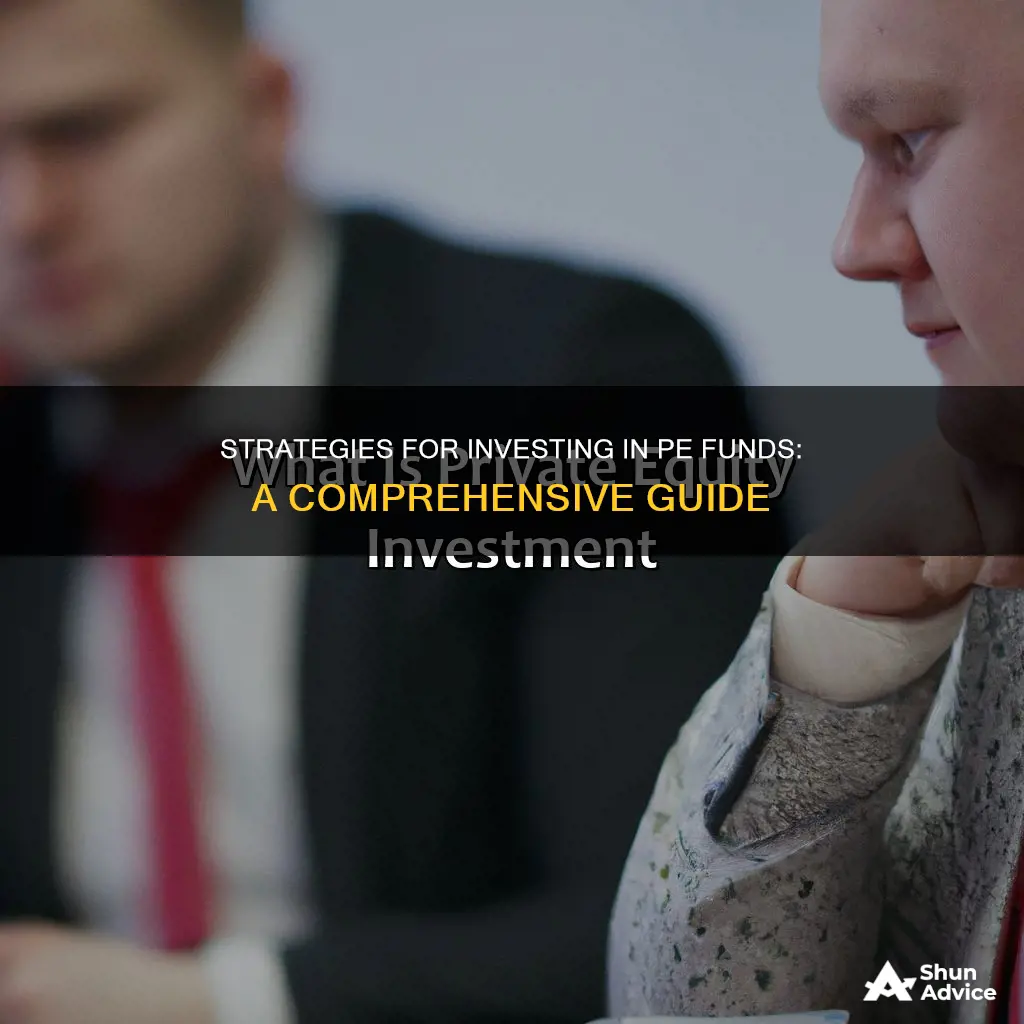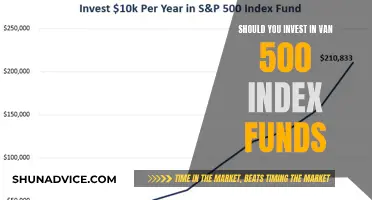
Private equity (PE) funds are an increasingly popular alternative investment option for those looking to diversify their portfolios. PE funds allow investors to support privately held companies that have not yet gone public. These alternative investments are all about potential and can reap generous returns. However, it's important to remember that investing in PE funds comes with high risks and long investment horizons.
There are now opportunities for select accredited investors to invest directly in PE funds or even directly in the businesses that PE sponsors are investing in. To become an accredited investor, one must either have an annual income of over $200,000 or a net worth of over $1 million.
When considering investing in a PE fund, it's crucial to assess your risk tolerance, understand the private equity firm's ability to generate returns and effectively manage risks, and ensure that there are checks and balances in place to provide third-party oversight of your investment.
| Characteristics | Values |
|---|---|
| Risk | High |
| Returns | High |
| Investment type | Private companies |
| Investor type | Individual investors, institutional investors, high-net-worth individuals, pension funds, sovereign wealth funds |
| Investment amount | $5,000 to $25 million+ |
| Time horizon | 4-10 years |
| Investor protection | Limited liability |
| Investor involvement | Limited partners are not involved in day-to-day management |
| Investor accreditation | Required by the SEC |
| Investor diversification | Recommended |
What You'll Learn

Understand the risks
Private equity investments are known to carry a high level of risk. Before investing, it is crucial to understand the potential risks and carefully assess your risk tolerance. Here are some key risks to consider:
Liquidity Risk
Liquidity risk is a significant concern in private equity investments. Liquidity refers to the ease with which investors can enter or exit their investments. Private equity investments typically have long holding periods, and investors are expected to keep their funds with the firm for several years, usually between four and seven years, or even longer in some cases. This lack of liquidity means that investors cannot easily access their funds or sell their investments if needed. In contrast, more traditional investments, such as stocks, mutual funds, or exchange-traded funds (ETFs), offer greater liquidity, allowing investors to sell their holdings on the same day if necessary.
Market Risk
Private equity investments also carry a higher market risk compared to traditional investments. The companies that private equity firms invest in are often unproven and may fail to live up to expectations. The failure rate among these companies is relatively high, and only a small percentage may provide significant returns. Market risk can arise from various factors, such as an ineffective management team, unsuccessful product launches, or new technologies becoming obsolete due to competition. There is no guarantee that the small companies in which private equity firms invest will grow or succeed, and this uncertainty poses a significant market risk.
Funding Risk
Funding risk is closely related to liquidity risk. It refers to the possibility that investors may not be able to fulfil their capital commitments. Private equity funds typically do not call upon all the committed capital at once but draw it down as investment opportunities arise. However, if investors face a funding shortfall, they may be forced to sell illiquid assets at a loss to meet their commitments, exacerbating potential losses.
Operational Risk
Operational risk pertains to the potential for losses due to inadequate processes, systems, or internal controls within the organisation. It is a key consideration for investors, regardless of the specific asset classes in which the private equity funds invest. Operational risk can arise from various factors, such as insufficient due diligence, poor investment decisions, or mismanagement of funds.
Capital Risk
Capital risk is closely related to market risk. While market risk pertains to the uncertainty of unrealised gains or losses, capital risk involves the possibility of incurring a realised loss of the original capital at the end of a fund's life. In the worst-case scenario, all the companies in a private equity portfolio could experience a decline in value, potentially dropping to zero. The quality of the fund manager and their ability to select companies with strong growth prospects play a crucial role in mitigating capital risk.
Other Considerations
In addition to the risks mentioned above, there are other factors to keep in mind. Private equity investments often have high investment minimums, which can amplify both gains and losses. The illiquid nature of private equity investments means that investors' capital is locked up for extended periods, and there may be limited opportunities for early redemption. Private equity firms also frequently use significant amounts of debt to finance their acquisitions, which can be costly over time due to interest payments. Lastly, the performance of private equity investments depends on the success of the underlying companies, and there is a high failure rate among startups and small growth businesses.
SP 500 Index Funds: A Smart Investment Choice
You may want to see also

Learn the language of alternative investments
Before diving into private equity investment, it is important to understand the language and field of alternative investments. Alternative investments are any investment besides stocks, bonds, and cash. Private equity is one of the many strategies that make up the alternative investment asset class.
- Alternative Investments: These are financial assets that do not fall into conventional investment categories such as stocks, bonds, and cash. Examples of alternative investments include private equity, venture capital, hedge funds, real estate, commodities, and cryptocurrencies.
- Private Equity: Private equity refers to investments in privately held companies or other assets that are not traded on stock exchanges. Private equity firms raise capital from investors to purchase or invest in these private companies, often with the goal of improving their operations, increasing their value, and eventually selling them for a profit.
- General Partners (GPs): In private equity, GPs are responsible for managing the fund's operations, making investment decisions, and offering strategic guidance to the companies they invest in.
- Limited Partners (LPs): LPs are investors who provide capital to the fund but do not participate in the day-to-day management or operations. They have limited liability, meaning their financial risk is capped at the amount they invest, and they receive a proportional share of the profits.
- Accredited Investor: Many alternative investment fields, including private equity, require individuals to be accredited investors. According to the U.S. Securities and Exchange Commission (SEC), this means having an annual income of over $200,000 or a net worth over $1 million, excluding the value of a primary residence.
- Fund Administrator: A third-party entity, often hired by private equity sponsors, that provides financial reporting and accounting services for the fund. They offer independent oversight of how the capital is invested.
- Carry or Carried Interest: The disproportionate profit share earned by the fund manager, typically around 20% of the profits, which exceeds their capital investment.
- Time Value of Money: The concept that money in the present is worth more than the same amount in the future due to its potential earning capacity.
- Liquidity: The ease with which an asset can be converted into cash without affecting its selling price. Alternative investments, especially private equity, tend to be less liquid than traditional investments.
- Arbitrage: The act of making a profit by simultaneously buying and selling the same asset in two different markets.
Understanding the language of alternative investments is crucial when considering private equity as an investment option. It provides foundational knowledge and helps investors make informed decisions about their investment strategies and portfolio diversification.
Smart Mutual Fund Investing in Today's Volatile Market
You may want to see also

Become an accredited investor
Accredited investors are those who meet certain requirements regarding income, qualifications, or net worth. They are typically wealthy individuals with access to unique and restricted investment opportunities, such as private equity, hedge funds, angel investments, and venture capital firms.
To become an accredited investor, you must meet the criteria set by the Securities and Exchange Commission (SEC). The SEC defines an accredited investor through income and net worth requirements in two ways:
- Income: An individual must have earned an income of over $200,000 in each of the last two years, with a reasonable expectation of earning the same for the current year. For couples, the joint income must exceed $300,000 for those years.
- Net Worth: An individual or couple must have a net worth exceeding $1 million, excluding the value of their primary residence. This exclusion of the primary residence is an important change introduced by the Dodd-Frank Act in 2010.
It is important to note that there is no formal process or certification exam to become an accredited investor. The companies issuing unregistered securities determine a potential investor's status by conducting due diligence before the sale.
The benefits of being an accredited investor include access to unique investment opportunities, potentially higher returns, and increased diversification. However, there are also drawbacks, such as high risk, high minimum investment amounts, high fees, and illiquidity.
If you meet the criteria, you can seek out these investment opportunities to build your wealth. However, remember that private equity investments are high-risk, and you should be prepared to lose all the money you invest.
Mutual Funds: Investing in Renewable Energy's Future
You may want to see also

Research and select a private equity firm
Researching and selecting a private equity firm is a crucial step in the investment process. You should choose a firm you trust, as they will be responsible for allocating your investment capital and controlling investment decisions. Here are some factors to consider when making your selection:
- Firm Reputation and Track Record: Conduct due diligence on the firm's previous investments and the returns they have provided for their clients. Evaluate their ability to generate investment returns and manage risks effectively. Look for firms with a proven track record of success and a strong reputation in the industry.
- Investment Strategy: Understand the firm's investment strategy and ensure it aligns with your investment objectives. Consider firms that specialise in specific sectors or investment types, such as venture capital, growth equity, or buyouts. Evaluate their approach to investing and their track record in those areas.
- Minimum Investment Requirement: Historically, the standard minimum investment amount for private equity has been high, but some firms have lowered their thresholds to attract a wider range of investors. Ensure you select a firm with a minimum investment requirement that matches your investment capacity.
- Performance and Returns: Assess the firm's performance and the returns they have generated for their clients. Look for firms with a consistent track record of delivering strong returns and outperforming the market.
- Risk Management: Private equity investments typically involve higher risks and longer investment horizons. Evaluate the firm's risk management strategies and their ability to navigate market volatility.
- Transparency and Disclosure: Choose a firm that provides transparent information about their investment strategies, fees, and potential risks. Ensure you understand all the terms and conditions before making an investment.
- Regulatory Compliance: Ensure the firm is compliant with relevant regulations and laws governing the private equity industry. This includes disclosure requirements, fee structures, and investor protection regulations.
- Connections and Network: Building connections and seeking advice from individuals with experience in private equity investing can be valuable. Consider seeking guidance from financial advisors or industry professionals who can provide insights and recommendations on reputable firms.
Remember to conduct thorough research and due diligence before selecting a private equity firm. Carefully evaluate their track record, investment strategies, risk management approach, and regulatory compliance to make an informed decision.
Index Funds: Why Don't More People Invest?
You may want to see also

Track industry progress
Tracking the progress of the industry in which you are investing is a crucial part of managing your assets over time. Here are some ways to track industry progress when investing in private equity (PE) funds:
- Monitor key metrics: Keep an eye on metrics such as Entry Multiple, Exit Multiple, Internal Rate of Return (IRR), Multiple of Invested Capital (MOIC), and Loss Ratio. These metrics provide insights into the performance and health of your investments.
- Stay informed about the economic environment: The economic landscape is constantly changing, and these changes can impact how a PE fund invests or manages its assets. Keep abreast of market conditions, economic trends, and political decisions that may affect your investments.
- Understand the context of the investment: As Harvard Business School Professor Randolph Cohen points out, context is key to understanding performance analysis. Gain extensive knowledge about the industry and market in which the receiving company operates. This will enable you to track new developments and make more informed investment decisions.
- Analyse performance measures: Familiarise yourself with common ways to measure investment performance, such as yield, rate of return, and total value to paid-in (TVPI). This will help you evaluate the success of your PE investments relative to other investment options.
- Utilise data and analytics: Leverage data and analytics to make more informed decisions throughout the PE investment cycle. This includes using company-generated data and alternative data sources to educate yourself about the market and refine your investment strategies.
- Monitor portfolio performance: Keep track of the value and performance of your private market assets. Although it can be challenging to obtain real-time data on private equity investments, stay updated through periodic reports and communications from fund managers.
- Evaluate progress towards investment goals: Regularly assess whether your PE investments are meeting your goals and objectives. This will help you identify areas where adjustments or rebalancing may be needed.
- Stay informed about industry news and trends: Follow industry publications, reports, and thought leaders to stay abreast of developments and trends in the PE industry. This can provide insights into successful investment strategies and potential areas of opportunity or risk.
Bond of America: State Investment Destinations
You may want to see also







